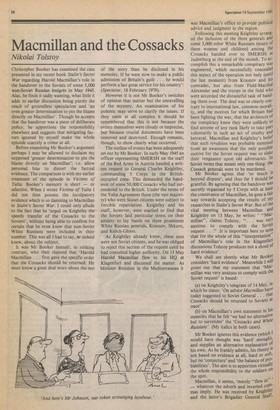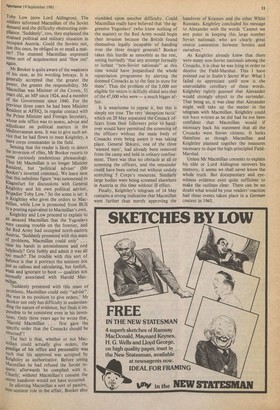Macmillan and the Cossacks
Nikolai Tolstoy
Christopher Booker has examined the case presented in my recent book Stalin's Secret War regarding Harold Macmillan's role in the handover to the Soviets of some 3,000 non-Soviet Russian emigres in May 1945. Alas, he finds it sadly wanting, what little it adds to earlier discussion being purely the result of groundless speculation and 'an even greater determination to pin the blame directly on Macmillan'. Though he accepts that the handover was a piece of deliberate policy, he apportions the responsibility elsewhere and suggests that mitigating factors ignored by myself make the whole episode scarcely a crime at all.
Before examining Mr Booker's argument perhaps I may be allowed to disclaim my supposed 'greater determination to pin the blame directly on Macmillan'; i.e. allow personal bias to distort the factual evidence. The comparison is with my earlier treatment of the episode in Victims of Yalta. Booker's memory is short — or selective. When I wrote Victims of Yalta I did not then possess the inculpatory evidence which is so damning to Macmillan in Stalin's Secret War. I could only allude to the fact that he 'urged on Keightley the speedy transfer of the Cossacks to the Soviets', without being able to confirm for certain that he even knew that non-Soviet White Russians were included in their number. This was all I had to say, Or indeed knew, about the subject.
It was Mr Booker himself, in striking contrast, who then claimed that 'Harold Macmillan . . . first gave the specific order that the Cossacks should be returned. He must know a great deal more about the rest of the story than he disclosed in his memoirs. If he were now to make a public admission of Britain's guilt . . . he would perform a last great service for his country': (Spectator, 18 February 1978).
However it is not Mr Booker's switches of opinion that matter but the unravelling of the mystery. An examination of his polemic may serve to clarify the issues. If they seem at all complex it should be remembered that this is not because the events themselves were cloudy or imprecise, but because crucial documents have been removed and destroyed. Enough remains, though, to show clearly what occurred.
The outline of events has been adequately set out by Mr Booker. In early May 1945 an officer representing SMERSH on the staff of the Red Army in Austria handed a written request to General Charles Keightley, commanding 5 Corps in the Britishoccupied zone. This demanded the handover of some 50,000 Cossacks who had surrendered to the British. Under the terms of the Yalta Agreement those (the vast majority) who were Soviet citizens were subject to forcible repatriation. Keightley and his staff, however, were startled to find that the Soviets laid particular stress on their anxiety to lay hands on three prominent White Russian generals, Krasnov, Shkuro, and Kelich-Ghirei.
As Keightley already knew, these men were not Soviet citizens, and he was obliged to reject this section of the request until he had consulted higher authority. On 13 May Harold Macmillan flew to his HQ at Klagenfurt and discussed the matter. As Minister Resident in the Mediterranean it was Macmillan's office to provide political advice and judgment in the region.
Following this meeting Keightley arranged the inclusion of the three generals and some 3,000 other White Russians (many of them women and children) among the Cossacks handed over to SMERSH at Judenburg at the end of the month. To accomplish this a remarkable conspiracy was engineered, which successfully concealed this aspect of the operation not bnly (until the last moment) from Krasnov and his comrades, but also from Field-Marshal Alexander and the troops in the field who were accorded the distasteful task of handing them over. The deal was so clearly contrary to international law, common morality, and the motives for which Britain had been fighting the war, that the architects of the conspiracy knew they were unlikely to find anyone of any rank likely to take part voluntarily in such an act of cruelty and betrayal. Macmillan and Keightley's belief that such revulsion was probable stemmed from an awareness that the only possible motive for the Soviet request was to slake their vengeance upon old adversaries. lit Soviet terms that meant only one thing: the Cossack generals were to be murdered. Mr Booker agrees that `so much is beyond dispute', and thus far I should be grateful. By agreeing that the handover was secretly organised by 5 Corps with at least the connivance of Macmillan, he goes a fair way towards accepting the results of mY researches in Stalin's Secret War. But of the vital meeting between Macmillan and Keightley on 13 May, he writes: "Macmillan", claims Tolstoy, ". . was verY anxious to comply with the Soviet request . . ." At is important here to note, that for the whole of this "interpretation' of Macmillan's role in the Klagenfurt discussions Tolstoy produces not a shred of hard evidence'.
We shall see shortly what Mr Booker considers 'hard evidence'. Meanwhile I will point out that my statement that `Macmillan was very anxious to comply with the Soviet request' is based: (a) on Keightley's telegram of 14 May, in which he states: 'On advice Macmillan have today suggested to Soviet General . . . that Cossacks should be returned to Soviets at once'. (b) on Macmillan's own statement in his memoirs that he felt 'we had no alternative but to surrender' the 'Cossacks and White Russians'. (My italics in both cases).
Mr Booker ignores this evidence (which I would have thought was 'hard' enough), and supplies an alternative explanation of his own. As he frankly admits, his theorY IS not based on evidence at all, hard or soft, but on 'conjecture' and 'the balance of probabilities'. The aim is to apportion virtuallY the whole responsibility to the soldiers 00 the sapcomt . Macmillan, it seems, 'merely "flew in whatever the adverb and inverted coolmas imply. He was received by KeightleY and the latter's Brigadier General Staff, Toby Low (now Lord Aldington). The soldiers informed Macmillan of the Soviet demand and the difficulty obstructing compliance. 'Suddenly', too, they explained the strained political and military situation in occupied Austria. Could the Soviets not, Just this once, be obliged in so small a matter? The stunned Macmillan expressed some sort of acquiescence and 'flew out' again.
Mr Booker is quite aware of the weakness Of his case, as his wording betrays. It is generally accepted that the greater the Power, the greater the responsibility. Mr Macmillan was Minister of the Crown, 51 Years old, an MP since 1924, and a member of the Government since 1940. For the previous three years he had been Minister Resident at AFHQ, in regular contact with the Prime Minister and Foreign Secretary, Whose sole office was to assess, advise and adjudicate on political matters in the Mediterranean area. It was to give such advice that he had flown to meet Keightley, a illere corps commander in the field.
Sensing that the reader is likely to detect the inversion of rOles, Mr Booker resorts to some curiously tendentious phraseology. Thus Mr Macmillan is no longer Minister Resident, but 'political adviser' (Mr Booker's inverted commas). We learn next that this nebulous figure 'was summoned to Klagenfurt for discussions with General Keightley and his own political adviser, Brigadier Toby Low.' So the scene is set: it is Keightley who gives the orders to MacMillan, while Low is promoted from BGS to a posting equivalent to Macmillan's own.
Keightley and Low proceed to explain to an amazed Macmillan that the Yugoslays Were causing trouble on the frontier, and the Red Army had occupied north-eastern Austria. 'Suddenly presented with this mass of problems, Macmillan could only' . . . raise his hands in astonishment and nod helplessly? Grin feebly and admit it was all too much? The trouble with this sort of defence is that it portrays the minister not Just as callous and calculating, but foolish, Weak and ignorant to boot — qualities not normally associated with Harold MacMillan.
'Suddenly presented with this mass of Problems, Macmillan could only "advise". He was in no position to give orders.' Mr Booker not only has difficulty in understan ding the nature of evidence, but finds it imPossible to be consistent even in his inventions. Only three years ago he wrote that, 'Harold Macmillan . . . first gave the Specific order that the Cossacks should be returned' !
The fact is that, whether or not Macmillan could actually give orders, the Prestige of his office and personality was such that his approval was accepted by keightley as authoritative. Before seeing Macmillan he had refused the Soviet request; afterwards he complied with it. Clearly, without Macmillan's consent the secret handover would not have occurred.
In allotting Macmillan a sort of passive, 000-sentient role in the affair, Booker also stumbled upon another difficulty. Could Macmillan really have believed that 'the aggressive Yugoslays' (who knew nothing of the matter) or the Red Army would begin their invasion because the British found themselves legally incapable of handing over the three emigre generals? Booker takes this hurdle as smoothly as the rest, noting hurriedly 'that any attempt formally to isolate "non-Soviet nationals" at this time would have jeopardised the whole repatriation programme by alerting the doomed Cossacks as to the fate in store for them'. Thus the problem of the 3,000 not eligible for return is skilfully elided into that of the 47,000 who were — a much bigger affair.
It is wearisome to repeat it, but this is simply not true. The very 'deception tactic' which on 29 May separated the Cossack officers from their followers prior to handover would have permitted the screening of the officers without the main body of Cossacks even being aware it was taking place. General Shkuro, one of the three 'wanted men', had already been removed from the camp and held in solitary confinement. There was thus no obstacle at all to screening the officers, and the remainder could have been sorted out without unduly stretching 5 Corps's resources. Similarly large bodies were being screened elsewhere in Austria at this time without ill effect.
Finally, Keightley's telegram of 14 May contains a strong indication that Macmillan went further than merely approving the handover of Krasnov and the other White Russians. Keightley concluded his message to Alexander with the words 'Cannot see any point in keeping this large number Soviet nationals who are clearly great source contention between Soviets and ourselves.'
As Keightley already knew that there were many non-Soviet nationals among the Cossacks, it is clear he was lying in order to deceive the Field-Marshal. This I have pointed out in Stalin's Secret War. What I failed to appreciate until now is the unavoidable corollary of these words. Keightley rightly guessed that Alexander would strongly object to the surrender. That being so, it was clear that Alexander might well take up the matter in the telegram with Macmillan. Keightley could not have written as he did had he not been confident that Macmillan would if necessary back his statement that all the Cossacks were Soviet citizens. It looks therefore as though Macmillan and Keightley planned together the measures necessary to dupe the high-principled FieldMarshal.
Unless Mr Macmillan consents to explain his role or Lord Aldington recovers his memory, it seems we shall never know the whole truth. But documentary and eyewitness evidence exist quite sufficient to make the outlines clear. There can be no doubt what would be your readers' reaction had these events taken place in a German context in 1945.



































 Previous page
Previous page